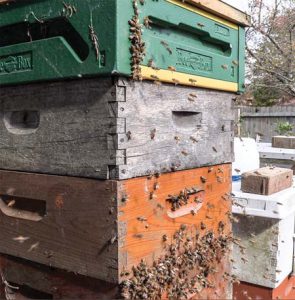By: James E. Tew
It’s a problem because we say it is…
Bee colonies robbing each other is a problem because we – as concerned beekeepers – say it is. And beekeepers say it’s a problem because apiary bees become defensive (and aggressive) within the area and secondly, weaker colonies can actually be robbed to death. These common beeyard results are not good – at least not for the beekeeper.
In some way, it would seem that the negligent beekeeper should have done something to forestall this rampant behavior. Admonishments to address honey bee robbing are in every basic beekeeping book – every last one of them. Things to do and things never to do, that control or prevent robbing are presented in concrete fashion. It’s like, “Here’s the problem,” and “Here’s the answer.” Advice from others free flows. Dealing with robber bees is an old and common apiary concern.
From another view, criminal bees seem perfectly happy to pillage the area. If entire book sections and years and years of advice abound, why do bees still perform the behavior so readily and so predictably? Clearly, there is some advantage for the bullish colony to forcibly take all the resources from a sad colony neighbor. There must be profits for the aggressor colony. To beekeepers, the activity appears to be criminality in the natural bee world, but to foragers, it’s all in a day’s productive work.
In his chapter in The Hive and the Honey Bee1, Dr. Norm Gary wrote, “Robbing behavior is, unfortunately, an anthropomorphic description of a special foraging behavior in which bees collect nectar and honey at hives or on unprotected combs of honey rather than foraging on flowers.”
I guess it could be said that Mother Nature is frequently not loving and nurturing. For instance, in an unforgiving world, I established two hypothetical colonies. One developed a large, healthy population and has hoarded surplus stores. It has done well during the season just past. It’s near colony neighbor, didn’t do as well. The reasons are irrelevant. Given the same environmental benefits, one colony did better than the other. One had a greater population than the other and more food reserves. That’s all that matters.
For honey bees in general, what would be a better survival scheme? To have one “good” colony and one “okay” colony try to survive the winter or to combine them and have one “great” colony try to get through the upcoming Winter?

James E. Tew
Enter the beekeeper
The beekeeper has invested money and time in both colonies. They will try to subsidize colony food reserves and possibly feed both colonies to get them through the Winter. It’s what we beekeepers do. We have two expensive queens – true fact that one must be better than the other – and we bought two packages (more money), and too often, overall hive numbers are an indicator of our beekeeper value. Somehow, it would appear that the more hives a keeper has, the greater the level of competence. Not necessarily, but that is a story for another time. Bottom beekeeper line? We would want both colonies to survive. To the beekeeper, it would seem that two colonies are better than one.
Nature’s opposing view
The biggest challenge a bee colony faces in a temperate climate is the long, foodless Winter period. Without enough food reserves, all the good health, great queens, genetics, Winter packing, and hive ventilation is for naught. Without adequate food reserves, the wintering colony will starve before Spring.
As the Autumn nectar flow wanes, and all flowering resources have been exploited to all profitable degrees, then the primary foraging source becomes the honey reserves in neighboring colonies. If the neighboring colony is not strong enough to defend its stores, then it most likely was not strong enough to survive the Winter. As Dr. Gary wrote in the reference presented about robber bees, they are not criminals so much as they are relentless foragers – even if it means foraging in their neighboring colony’s pantry.

Are these bees forager or thieves?
Robbing is more than a simple beekeeper inconvenience
Online, it is essentially impossible to uncover academic information about the biology and ecology of robbing behavior. Hundreds of listings immediately present generalized robbing control methods with time-honored recommendations. Don’t have colonies too close together. Reduce entrances. Don’t open colonies during a dearth. Don’t leave comb scraps exposed. If you have managed bee colonies more than a full year, you have read the generalized recommendations. There is nothing wrong with this advice. No harm done. But know this, bee colonies will rob each other, and they will do it every season. The only way to completely eliminate robbing behavior is tremendously reduce colony density. In a robber-free world, a colony would have no near bee neighbors.
Robbing behavior is more than unemployed foragers, rife with frustration and boredom, searching anywhere and everywhere for food in any form. Colony foragers are aggressively competing with foragers from other colonies – in a life and death arena.
I have taken the following insert, verbatim from Wikipedia.
“In ecology, scramble competition (or complete symmetric competition) refers to a situation in which a resource is accessible to all competitors (that is, it is not monopolizable by an individual or group). However, since the particular resource is usually finite, scramble competition may lead to decreased survival rates for all competitors if the resource is used to its carrying capacity. Scramble competition is also defined as “[a] finite resource [that] is shared equally amongst the competitors so that the quantity of food per individual declines with increasing population density”.[1] A further description of scramble competition is “competition for a resource that is inadequate for the needs of all, but which is partitioned equally among contestants, so that no competitor obtains the amount it needs and all would die in extreme cases.”
Robbing seems to be a form of Scramble Competition – at first
For bee foragers, it’s a timed game. The clock is operated by the nectar flow. While the flow is ongoing, each colony forager maniacally gathers whatever she can bring back to the colony’s storeroom. At this point, I simply cannot get off the subject of this article, but R. Page, in his book, “The Art of the Bee3,” reveals that not all foragers are out for the biggest bang for their buck. While most foragers are going for the maximum load, some scouts are searching for alternative sources that are sometimes lesser food producers than what is presently available to the colony. So much as possible, no food source (blossom or otherwise) is ignored, but it would be wrong to let the reader think that during good nectar and pollen flow times, all foragers come back fully ladened. As Page discusses, foraging decision-making is a complex issue.
What about Contest Competition?
Does robbing behavior shift to Contest Competition as the season progresses? So hypothetically, all foragers are out on the game field, being as successful as possible and the game clock, the nectar flow, runs out. The ending bell, the first frost of early Winter, sounds and floral foraging comes to an end. Commonly, food dearths occur in mid-Summer or during Winter. Flowers are no longer producing food rewards. That is when I suggest that the second type of interspecific competition comes into play – Contest Competition. Contest competition4 is a form of competition where there is a winner and a loser and where resources can be attained completely or not at all. This is the case of the robber and the hive being robbed – one winner and one loser.
Though nectar sources have finished flowering, the weather is still warm enough for bee flight. Experienced foragers are still on the job, but no sources are out there. Robbing conditions are at hand. Beekeepers know that this is the time that colonies begin to attack each other. That some colonies survive the Winter is paramount to the survival of the species. If one wants to see the concept of “Survival of the fittest” in play, just watch the pandemonium that robbing causes within the apiary.
Pure frenzy
Historically, still photos have been presented to show events that really couldn’t be shown in a still photo. The wonderment of watching a bee dance is completely lost in a still photo. I write about a dozen articles a year asking what washboard movement is showing. A still photo does not capture the washboard behavior movement. Until you see hundreds of bees performing the rhythmic motion of the unexplained behavior, a beekeeper cannot grasp the event.
Robbing frenzy is one of those bee behavioral events that is poorly captured by still photography. Look at my short clip at: or look at any other bee robbing clip on the web. True chaos. Pure frenzy. To fully appreciate, you simply must see and hear the hellish event. I don’t have words and terms to express what a full-featured robbing event looks and sounds like.
I get it – as best I can
Okay. In some fashion, using some rational foraging plan, bees have “scrambled” to garner what they could from flowering plants in their immediate ecosystem. That aspect of the season ending, foragers moved to some other type of non-blossom foraging paradigm – maybe contest competition. Winner take all. It’s a brutal, unfair world out there for bees. Even so, I cannot explain the electric frenzy that pervades my apiary when robbing is in play. The whole area, far beyond my beeyard, is energized. I feel an odd urge to type my comments here in upper case and bolded. These bees are absolutely nutso. Absolutely.
We are part of the problem
This is one of my guesses. The insanity shown by robbing bees can only be due to the unnatural positioning of numerous colonies near each other. As beekeepers we do that and call the assemblage an “apiary.” There are no natural apiaries in the wild. If I may be blunt, can I say that overall, while great for the beekeeper, I sense that an apiary is not a good thing for bees. It’s where beekeepers concentrate bee diseases, suppress natural swarming, violate brood nest sanctity, entice animal pests, and yes, set the groundwork for massive robbing behavior.
As has become my style, without a shred of original data and without an adequate literature search, I speculate that robbing behavior commonly occurs in nature, but with much less fanfare and commotion. Natural nests are spaced far apart – not just a few meters, and populations are much smaller. Mortal battles are fought, won, and lost. But all of this is out of sight from the prying beekeeper. Resources are reapportioned and a natural nest cavity is made ready for a replacement swarm next spring. Importantly, population dynamics are adjusted to reflect the current carrying capacity of the immediate ecosystem.
I am speculating
Robbing is not simply an inconvenience for beekeepers who are trying to maintain colony numbers. Robbing is a population adjustment strategy that reallocates valuable resources to colonies better suited for seasonal survival. Essentially, the colonies with the best chance for survival get the food reserves of those with a lesser chance of Winter survival.
I speculate even more
In my beeyard, I would guess that as the flowering season comes to an end, some behavioral shift occurs in foragers. Rather than witnessing recruitment dances and learning flowers, foragers seem to broaden their search parameters to anything that smells and tastes of carbohydrates. I would guess, that within my beeyard, there is a general mingling of foragers from colonies that are testing neighboring colonies. If a colony is able to rebuff exploratory robbers, they protect their resources and their scouts possibly find a colony that is having difficulty protecting whatever it has. I suppose I am writing, that during robbing periods, probably all colonies are explored for possible robbing targets, but some are able to resist. Others can’t withstand the onslaught.
But I am at a loss to suggest a way that other robbing foragers are recruited to the newly found weak colony. Ribbands5 said that robbers were using odor cues to find robbing sources and entrances. I don’t doubt that observation, but does it feel a bit inadequate? Why the raging confusion and how are recruits finding the victim source? In the same beeyard, recruitment dances would be generalized. What’s new about the odors. These odors have been there all season long. During robbing periods, what’s different that lets bee sister turn on bee sister so aggressively?
There is one thing . . .
There is one visible characteristic of robbing bees – their erratic, jerky flight. It has long been reported that bees develop that personality because they have been accosted by innumerable guard bees. In some cases, even their thoracic hair has been rubbed away. But just let me ask, “Is it possible that the erratic flight behavior of robbers is a cue for enticing robber recruits to a beleaguered colony?” I am not strongly bonded with my own question. But I am bonded with this notion – there is something different in a beeyard that is attacking and being attacked by robbers. Everywhere this energy, this franticness is exhibited. What bee yard characteristics changed?
I’m not finished…
I am not finished, but my monthly space allocation is filled. In a companion article within a few months, I would like to contribute robbing comments on entrance restrictions, robbing cages, robber behavior and other beekeeper procedures. I hope you don’t mind. Obviously, I have this bee behavior on my mind.
To be crystal clear
I want to be perfectly clear that the citation I posted concerning Scramble and Contest Competition is not my written work. I copied it and then cited it in the URL presented in footnotes. This is the first time I have used a citation that had other URLs embedded. I want to be sure I am crediting the original authors in a proper way.
Thank you.
As always, I appreciate you reading my rambling comments. Readers are a great thing for any writer. Thank you.
Dr. James E. Tew, Emeritus, Faculty, Entomology, The Ohio State University and One Tew Bee, LLC; tewbee2@gmail.com; http://www.onetew.com







